|
|
|

- Herbal Magic (Mental 2, Intelligence/Knowledge -2) — This special nonweapon
skill represents a specialized knowledge of herb lore which allows
a character to utilize a variety of herbal and other raw materials
to concoct herbal brews. This advanced skill differs from Herbalism in the fact that it reflects knowledge of how various herbal
extracts interact with each other to produce a desired effect.
Herbalism, on the other hand, deals only with the identification,
gathering and use of individual herbs for specific needs.
- Herbal Magic may be learned by a character of any class who has
a skill score of at least 50% in Herbalism and 25% in Brewing. However, druids and specialty priests of St. Hubert the Healer with the required prerequisite skills may learn Herbal Magic
as a Mental 1 skill.
- A character with knowledge of Herbal Magic can create special
herbal brews which have effects similar to magical potions, oils,
powders, etc. However, despite their effects these brews are nonmagical
in nature.
- An herbal brew is a concoction of several herbs (and sometimes
fungi or tree bark) that produces an exotic effect. The name of
a brew usually does not refer to the herbs in it, but to its effects.
Herbal brews require no magical plants; power comes from the combination
of herbs and the secret techniques the herbalist uses during each
stage of preparation.
- Locating the Herbs: Finding an herbal brew’s ingredients requires, first, determining
the right place to look. The herbalist must search in the proper
terrain for the time indicated in the brew’s description below.
Second, the character must make an Herbalism skill check, applying
the brew’s search modifier and a -20% penalty for snow-covered
ground or darkness, if applicable. Success means the herbalist
locates enough herbs to produce one brew (unless the brew description
indicates otherwise); failure means the character finds none.
In either case, additional searches may be made, though an herbalist
really should search only once per square mile of appropriate
terrain. Repeated searches of an area carry a cumulative -10%
penalty — there may be nothing there to find!
- Preserving herbal ingredients: Most herbs work best while fresh, but an herbalist may wish to
store some for future use rather than immediately turning them
into brews. Preserving ingredients by drying, powdering, and packing
the herbs takes six hours per set of ingredients (enough for one
brew) and requires a successful Herbalism check. The DM makes
this roll, informing the player whether the ingredients have spoiled
only when the herbalist tries to use them in a brew. A successful
roll ensures the herbs stay fresh while in a waterproof container.
Failure indicates they will spoil in 1d6 days.
- Making an herbal brew: To create an herbal brew, the herbalist must have the appropriate
ingredients, either fresh or preserved. The brewing process requires
a quiet place that fosters deep concentration. It involves both
physical work (chopping and cleaning herbs, mixing the ingredients
in proper portions, steaming them, etc.) and ritual gestures and
prayer.
- After preparing the concoction (which takes as long as the brew’s
description specifies), the herbalist rolls a skill check, using
the modifiers shown. In addition, a -10% modifier applies if the
herbalist used preserved rather than fresh herbs. A successful
check means the herbalist creates the brew. Failure means the
herbalist ruins the ingredients; a roll of 91-00% always fails.
- An herbalist with several sets of ingredients for the same herbal
brew may mix multiple batches at the same time. If the final skill
check succeeds, the herbalist concocts all the batches; if it
fails, the ingredients all go to waste.
- Types of herbal brews: Following are descriptions of various herbal brews. Each brew
entry includes these details
- Terrain describes where to find ingredients for the brew, as well
as any special notes (gather only at night, etc.).
- Search Time/Modifier indicates how many hours an herbalist must
search for the brew’s ingredients and offers a modifier to the
Herbalism skill check that determines whether the herbalist finds
them.
- Preparation Time/Modifier details how many hours it takes the
herbalist to prepare the brew and provides a modifier to the Herbal
Magic skill check needed for successful brewing.
- Application describes how to apply the brew either as a tea, elixir,
ointment, poultice, vapor, powder or consumable. An item is a
catchall category for Herbal Magic creations which do not fall
into any of the other categories.
- A tea consists of a mixture of broken or crushed, dried herbs infused
into water.
- Elixirs are syrupy concoctions that are drunk. The rules for drinking potions apply to herbal teas and elixirs. Teas keep indefinitely in dry form.
- An ointment is a brew mixed with lard, beeswax, lanolin or another similar base which is rubbed onto skin. Treat it as a magical oil.
- A poultice consists of a damp herbal brew bandaged onto a wound or area of skin. The contents of the poultice soaks into the skin gradually. Applying a poultice takes two rounds; it can be applied only to an unresisting or grappled subject.
- A vapor, a mixture intended to be inhaled rather than drunk, usually affects an area. The dry ingredients must be stirred into boiling water so the brew’s recipient can breathe in the steam. Administration requires two rounds and a source of hot water.
- Powders are finely crushed herbs which are used according to the rules for magical powders.
- Consumables are herbs blended and formed into cakes or paste which are eaten.
- Effects describes what the brew does.
- Save explains what kind of saving throw, if any, can resist the
brew’s effects. Most saving throws are against poison — even if
a brew is not actually deadly.
- Value is the gp sale value of a single application of the herbal
item on the open market.
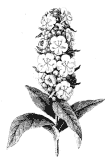 Aaron's rod poultice Aaron's rod poultice
Terrain: Sunny slopes, cliff faces, rock quarries
Search Time/Modifier: 6/0
Preparation Time/Modifier 2/0
Application: Poultice
Save: None
Value: 10 gp
- Effects: Aaron's rod, the main ingredient of this poultice, has
many large, pale silvery-green leaves that feel like soft felt.
These leaves surround a thick, tapered stalk of large flowers
and smaller leaves, which grows to four or five feet in height.
The flowers are bright yellow, bearing five petals each. Aaron's
rod has a long, white, wood-like root. This herb grows only in
rocky or clay soil and the flowers only appear in midsummer.
- By mixing five crushed flowers with wine and applying the compound
to a fresh wound, it deadens pain. This has the effect of temporarily
healing 1d4 hit points. However, the duration is only two hours
and after the effects expire, the wound damage is reassessed.
The poultice may be reapplied every two hours.
- A typical search will yield enough flowers to produce 2d6 applications
of this poultice.
Beorunna’s cure-all
Terrain: Plains
Search Time/Modifier: 6/0
Preparation Time/Modifier: 6/0
Application: Tea
Save: None
Value: 25 gp
- Effects: The stems of the Beorunna plant when collected and cured
properly can be blended into a tea which when used in conjunction
with other curative herbs and brews increases their potency. It
gives a +10% bonus for curing all diseases or a +2 bonus for healing
hit points. It can be used in addition to any of the other curative
herbs, spells or magic items, supplementing their effects. However,
if taken alone it has no effect.
Banisher of fear
Terrain: Swamp and deep forest
Search Time/Modifier: 12/-40%
Preparation Time/Modifier: 12/-30%
Application: Tea
Save: Neg. if save vs. spell.
Value: 150 gp
- Effects: This compound of mushrooms and plant sap when brewed
as a pungent tea has the power to neutralize fear-based attacks
resulting from spells like cause fear or from seeing a fearsome
sight (such as a lich or dragon). A single dose lasts 3d6 turns.
However, a user who has the ability to attack as a berserker will
not do be able to do so while under the influence of this brew
nor will anyone under the influence of this brew initiate combat.
The absence of fear removes the competitive edge (Intelligence
is not affected, however). However, a character who has consumed
Banisher of Fear will fight normally when attacked or when directed
to do so by other members of the party.
- There is a 1 in 10 chance that a normal dose of this brew will
cause the user to immediately go to sleep and stay that way until
the effects wear off. Stimulants like an odor of wakefulness (see
below) work temporarily to awaken a character under these effects,
but the character returns to sleep during the next turn.
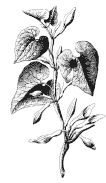 Birthwort Birthwort
Terrain: Pastoral (along hedges and fences), sunlit thickets
Search Time/Modifier: 2/0
Preparation Time/
Modifier: 1/0
Application: Poultice
Save: Special
Value: 10 gp
- Effects: When the leaves and roots of birthwort — a bushy climbing
vine with thin yellow, tubular-shaped flowers — are boiled briefly
and combined with other herbal ingredients to make a poultice
which is placed on a wound, it will help prevent infection, thus,
causing the wound to heal more rapidly. In game terms, a wounded
character heals an extra hit point per day of rest for two days
after a wound is inflicted. Thereafter, the wound heals normally.
- A second use of this herbal brew is to crush birthwort leaves
and stems and other herbal ingredients to create a juice which
when applied to a bite or sting from a poisonous creature allows
a +2 bonus to the saving throw if applied before the poison runs
its course.
- Note, the herbs used in this poultice can have an adverse effect
on nonhumans and is deadly to lizard men and other reptilian creatures.
If a nonhuman is treated with a birthwort poultice, he must save
vs. poison or become temporarily paralyzed. This paralysis is
so severe that it is indistinguishable (by sight) from death and
lasts for 1d8 rounds, beginning two rounds after the application.
- Lizard men and other reptilians who fail a save vs. poison at
-2 fall into the same paralytic state but then die at the end
of the 1d8 round duration. This effect is not common knowledge;
even characters who are familiar with birthwort have only a 50%
chance of knowing about this side effect before they experience
it or witness it.
- A typical search produces enough raw materials to produce 1d4
poultices.
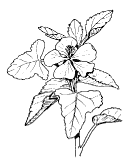 Boneset Boneset
Terrain: River banks, ditches
Search Time/
Modifier: 8/-30%
Preparation Time/Modifier: 48/-30%
Application: Elixir/Tea
Save: None
Value: 100 gp
- Effects: The leaves of boneset — a small perennial flower which
grows to 12" in height — can be used in combination with other
ingredients to make a spicy tea that has a 50% chance of healing
one point of damage per pint of tea consumed. However, boneset
flowers more potent and are the primary ingredient of a more powerful
brew detailed below.
- If boneset flowers are collected while in bloom on a moonless
night and preserved, they can be used in combination with other
herbs to make a powerful elixir that rapidly closes and heals
wounds. The plants needed to create this brew cannot be grown
under controlled conditions, such as the plot of a healer or gardener
and it is said that St. Hubert watches over these rare plants.
A good indication of a healer's abilities is reflected in the
amount of boneset brew he has in stock.
- An elixir concocted from boneset flowers collected on a moonless
night will cure 3d6 hit points of damage, including damage caused
by critical wounds, when consumed. In addition, the imbiber experiences
such an intense sensation of well-being that he feels and acts
invincible, gaining a +4 bonus to saving throws vs. fear spells
or similar magic for the following day. An elixir made from flowers
collected at any other time only cures 1d4 hit points of damage
and does not cure critical damage or impart a feeling of well-being.
Burn salve
Terrain: Any non-arctic
Search Time/Modifier: 4/0
Preparation Time/Modifier: 1/0
Application: Ointment
Save: None
Value: 25 gp
- Effects: This unguent for treating minor burns is made from cream,
honey and herbs. It restores 1d6 hit points of damage caused by
either natural or magical fire. This salve can only be used once
on a particular burn.
Crawlbane
Terrain: Swamp and deep forest
Search Time/Modifier: 6/-5%
Preparation Time/Modifier: 2/-5%
Application: Ointment
Save: None
Value: 10 gp
- Effects: This ointment strongly repels insects. Anyone covered
head to foot in it remains unaffected by normal insects, even
those summoned by spells such as creeping doom and insect plague.
Giant insects still may attack the character, but do so at a -3
penalty, due to their revulsion.
Darkweed
Terrain: Desert oasis
Search Time/Modifier: 6/-10%
Preparation Time/Modifier: 10/-20%
Application: Ointment
Save: Neg. if save vs. spell
Value: 250 gp
- Effects: A character who smears this ointment over both eyes becomes
blind within two rounds. However, the character can see invisible,
astral, ethereal, or illusory objects as if they were real and
fully visible for the next turn.
Deathmock
Terrain: Mountain slopes
Search Time/Modifier: 4/-15%
Preparation Time/Modifier: 6/-15%
Application: Tea
Save: Neg. if save vs. poison
Value: 25 gp
- Effects: Deathmock causes the drinker to fall into a cataleptic
trance; the character displays muscle rigidity and does not appear
to breathe or have a heartbeat. While injuries cause the imbiber
little bleeding, he otherwise suffers normal damage. A person
under the influence of this tea sleeps for 2d4 days, during which
time he needs no food or water. The drinker needs only five percent
of the air an unaffected person would need and can survive freezing
temperatures.
Feverblend
Terrain: Swamp
Search Time/Modifier: 12/-40%
Preparation Time/Modifier: 3/0
Application: Tea
Save: Neg. if save vs. poison
Value: 250 gp
- Effects: This collection of crushed rare flowers when brewed in
a tea has the effect of temporarily curing insanity. If a person
suffering from the effects of insanity or a failed Sanity Check
imbibes this brew their mental illness is cured for 1d10 hours.
Permanent insanity will return after the brew wears off.
Fiendflower
Terrain: Deep forest or jungle
Search Time/Modifier: 12/-20%
Preparation Time/Modifier: 8/-15%
Application: Tea
Save: Neg. if save vs. spell
Value: 100 gp
- Effects: A character who drinks this bitter tea sees horrifying
visions that drive him temporarily mad. After 1d20 turns, a drinker
suffers an episode of 2d6 minutes, during which he becomes enraged,
violent, and homicidal; such a PC should be played by the DM.
Afterward, the drinker cannot recall what happened during the
episode, which recurs once per day (at irregular intervals) for
the next 2d4 days. A neutralize poison spell ends fiendflower’s effects.
Ghostroot
Terrain: Old graveyards at night
Search Time/Modifier: 8/-20%
Preparation Time/Modifier: 4/-30%
Application: Vapor
Save: Neg. if save vs. spell
Value: 150 gp
- Effects: This mixture’s luminous vapors repel undead. Any undead
attempting to draw near must save vs. spell. Failure prevents
them from approaching within 10 feet of the steaming brew. Success
allows them to ignore its effects; once they save, they remain
immune to the brew for the rest of the day. The vapors last for
one turn.
Graveolens
Terrain: Sunny rocky flat lands, badlands
Search Time/Modifier: 24/-30%
Preparation Time/Modifier: 24/-10%
Application: Elixir
Save: None
Value: 50 gp
- Effects: The small yellow flowers of the graveolens shrub which
blooms throughout the summer are crushed and pressed with the
blue-green, bipinnate leaves of the plant to yield a strong, bitter
tasting, aromatic oil. When the extracted oil of this rare evergreen
perennial is mixed with other special ingredients it can be used
as a preventative against diseases of all kinds.
- The oil provides a saving throw against contraction of lycanthropy,
similar to the benefit bestowed by belladonna. If at least one
ounce of the oil is consumed by the victim within an hour of being
bitten by a lycanthrope, the consumer is granted a saving throw
vs. poison at +2 to avoid the disease. The oil's bitter taste
and caustic nature cause the drinker to suffer 1d3 hit points
of damage when it is consumed (no save). However, as a beneficial
side effect, whether or not the consumer contracts lycanthropy,
the oil allows a bonus of -5% to the drinker's chance of contracting
any other disease for one week afterward.
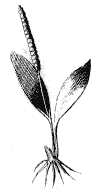 Green oil of charity Green oil of charity
Terrain: Moist meadows, shady forest clearings
Search Time/Modifier: 4/0 (+5% bonus in late spring)
Preparation Time/
Modifier: 4/0
Application: Ointment
Save: None
Value: 10 gp
- Effects: This herbal ointment is used as a secondary treatment
to help wounded characters regain strength. It utilizes the herb
Adder's tongue as its primary ingredient.
- Adder's tongue has one large leaf at the base of which rises a
thin stalk covered with tiny bumps or knobs. On closer inspection,
this stalk is seen to be a spike of tiny, yellowish-green flowers.
- By boiling the cut up leaves in hog's fat and then straining out
the sediment, an ointment can be produced which promotes rapid
healing and cures minor wounds. In game terms, a character treated
with this ointment regains an additional 1d3 hit points per day
of rest. It can also be applied to minor wounds to cure 1d2 hit
points of damage. The oil may only be applied once per day; additional
applications have no effect.
- A typical search produces enough raw materials to produce 1d10
applications.
 Henbane Henbane
Terrain: Forest clearings
and paths
Search Time/Modifier: 4/0
Preparation Time/
Modifier 2/0
Application: Poultice
Save: Special
Value: 25 gp
- Effects: Henbane, the primary ingredient of this poultice, has
large soft leaves which lie low to the ground. The thick leaves
are covered with hair and deeply cut. Many short, thick stalks
spread with branches and smaller leaves produce hollow, yellow
flowers with large sepals covering much of the petals; the petals
are laced with purple veins and the flower bears tiny, gray seeds.
The root is thick and branched, much like a parsnip root. The
plant has a heavy, offensive smell.
- When the Henbane leaves, seeds and roots are boiled in a small
amount of water with other special ingredients and applied as
a poultice to wounds they have the effect of numbing pain and
immediately restore 1d6 hit points. However, 1d4 of these hit
points will “wear off” after two hours (when the painkilling effect
ends).
- The numbing effect of this compound is deleterious to a character
who attempts to fight or engage in other strenuous activity; a
character who attempts to do so is penalized by -1 to hit and
-1 to Armor Class.
- When used against fever (by applying a poultice to bare skin),
it will restore one point of lost Strength and Constitution per
day; this treatment can be used daily until the victim has fully
recovered.
- Note, henbane brew is very poisonous if taken internally: If ingested
in any form or amount, the herb will cause 2d6 hit point of poison
damage (save vs. poison for half damage) in the round following
ingestion and the affected character will fall unconscious for
1d4+2 turns thereafter.
- Also, the herb has hallucinogenic properties that may affect the
character preparing the poultice. While boiling the plant, the
character has a 40% chance of inhaling fumes that will act as
a hallucinogen. If this happens, the DM may moderate the effects
or roll 1d6 to determine what happens: 1-2, the character sees
imaginary enemies in the distance and runs off to fight them;
3-4, he becomes unaware of his surroundings and refuses to respond
to any stimulus; 5-6, he sees other party members as enemies and
attacks them immediately. The hallucinogenic effects will last
for 1d6 rounds.
Hushthorn
Terrain: Forests at night
Search Time/Modifier: 4/-15%
Preparation Time/Modifier: 4/-15%
Application: Tea
Save: Neg. if save vs. poison
Value: 25 gp per dose
- Effects: This tea causes a drinker to fall into a deep, natural
sleep, from which he cannot be awakened for 2d10+13 hours.
Itching powder
Terrain: Forest or plains
Search Time/Modifier: 12/-20%
Preparation Time/Modifier: 12/-20%
Application: Powder
Save: Neg. if save vs. poison.
Value: 25 gp
- Effects: This compound, made from flower pollen, causes any creature
coming in contact with it to itch violently for 1d10 rounds. Creatures
with better than low intelligence will be annoyed but otherwise
unaffected. Creatures of low intelligence fight poorly as a result
(-2 to hit, -2 AC penalty) and will attempt to leave the area
when possible. Less intelligent creatures lose all interest in
activities other than scratching. For example, a lurker above
would release its prey and roll about wildly, but an orc would
attempt to combine fighting and scratching until it had a chance
to run.
- Wine removes the powder, while water only makes its effects more
pronounced (-3 penalty to hit and AC). The powder may be dispersed
like any magical dust.
Mask of clear air
Terrain: Forest and rural
Search Time/Modifier: 2/0
Preparation Time/Modifier: 2/-10%
Application: Item
Save: None
Value: 50 gp
- Effects: An herbalist may gather peach pits and char them to make
a charcoal-like substance, which is then crushed and placed into
loosely woven, flaxen bags large enough to cover the nose and
mouth. When faced with gas or smoke, characters can cover their
faces with these masks to gain a +4 bonus to their saving throws
against any ill effects caused by gas or smoke. Like all nonmagical
devices, the bag is ineffective against magical gas attacks.
- Straps are sometimes attached to hold the bags over a character’s
face for an extended period of time, however, while the mask is
in place, the character attacks with a -1 penalty to hit. The
masks can be used effectively for 7-12 (1d6+6) turns.
Medicinetree
Terrain: Forests
Search Time/Modifier: 6/-15%
Preparation Time/Modifier: one week/-50% for elixir; 1/0 for tea
Application: Elixir/Tea
Save: Special
Value: 250 gp for elixir/25 gp for tea
- Effects: The small, slender medicinetree bears an orange berry
that is commonly collected by alchemists, healers and spellcasters.
Only healers seem to make productive use of it, by mixing it with
special ingredients to create a nourishing beverage which is said
to “strengthen the body in 18 different ways, firm one's resolve
and clear the mind.” Medicinetree leaves are used in high-priced
teas, having a distinctive nutty flavor and passing on some benefits
of the berries.
- The berries are mildly poisonous while raw, causing 2d6 hit points
of damage and leaving the victim with a gastric distress (-1 to
hit in melee) for 1d4 hours after consumption (save vs. poison
to halve damage and duration), but simple boiling denatures the
toxin. The berries are collected by wild halflings and Fälgornian
humans, who stew them with other berries and roots to make a potent
alcoholic beverage. This drink is sold in some taverns as “Fälgornian
Firebrew.”
- Mashing the leaves and straining hot water through them produces
a weak tea that acts as a curative, healing one hit point of damage
per pint consumed.
- The most effect use is the creation of an elixir from berries
brewed by a special process only known to herbalists. The elixir
provides the drinker with a +1 bonus to Strength, Intelligence
and Wisdom for 1d4 hours. It also gives a +1 to saving throws
vs. mind-control spells such as charms, fear and command during
that time and provides an immediate saving throw if the consumer
is currently affected by a mind-control spell.
- Note, continual use of this elixir causes the body to develop
resistance to its key components. Thus, this elixir may only be
used once per week effectively. Additional uses provide no benefit
to the drinker.
Mother’s leaf
Terrain: Coastal marshes
Search Time/Modifier: 6/-10%
Preparation Time/Modifier: 24/-20%
Application: Tea
Save: None
Value: 50 gp
- Effects: The leaves of this plant when cured in saltwater and
blended with dried algae can cure some diseases. The drinker of
this tea has a 30% chance to be cured of any nonmagical disease.
This herbal tea also has the unique property of curing magical
mummy rot with a 90% chance of success.
Nevermind
Terrain: Forest clearings or caverns
Search Time/Modifier: 8/-15%
Preparation Time/Modifier: 8/-35%
Application: Tea
Save: Neg. if save vs. spell
Value: 50 gp
- Effects: Characters develop amnesia one minute after drinking
this tea, permanently forgetting all events since they last slept.
Odor of sleep
Terrain: Deep swamp
Search Time/Modifier: 12/-15%
Preparation Time/Modifier: 12/-15%
Application: Vapor
Save: Neg. if Save vs. poison.
Value: 50 gp
- Effects: Anyone breathing the fumes of this primitive ether will
become drowsy, insensitive to pain, slightly dizzy, and for a
period of three turns, will attack at -3 to hit and defend with
a -1 penalty to Armor Class.
- Both the liquid and gas are explosive. If used in a confined area
where there is an open flame, there is a 5% chance per turn of
an explosion that does 3-6 hp damage to anyone within a 20-foot
radius. This quality should be kept in mind in the event of accidental
breakage of a vial containing the odor of sleep. The danger can
be avoided by using magical lighting such as continual light or
faerie fire. However, produce fire, produce flame and similar
spells that create a real flame cause an immediate explosion.
Odor of wakefulness
Terrain: Hills, Mountains
Search Time/Modifier: 12/-15%
Preparation Time/Modifier: 12/0
Application: Vapor
Save: None
Value: 50 gp
- Effects: Herbalists can use special herbs which when mixed with
liquid create a vapor which can be used to revive an unconscious
creature. Holding an open bottle of the compound under a victim’s
nose results in an immediate return to consciousness of a victim
who will remain unconscious for one turn or less without assistance.
If the victim will remain unconscious for longer than a turn without
assistance, then a return to consciousness is 50% likely to occur.
Treatment can be repeated once per round if it is initially unsuccessful.
Redoil
Terrain: Grasslands, woods, hedges and meadows
Search Time/Modifier: 2/0
Preparation Time/Modifier: 2/0
Application: Ointment
Save: None
Value: 1 gp
- Effects: The common plant, redoil, is a fundamental material of
the healer's art. A small flowery herb, it is found dotting grasslands,
woods, hedges and meadows with its cheery yellow flowers during
the summer months. Its pale green leaves contain the glands which
secrete the plants fabled red oil.
- The oil — after being prepared by a special process — can be used
as a rub for bruises, a salve for nicks and cuts or as a preparatory
packing for open wounds. A traveler would be well advised to purchase
a vial of redoil before a journey. Because of its inexpensive
cost, it can be used as a foot rub, if nothing else, at the end
of a trip.
- Rubbing the oil requires one round and heals 1 hp per application.
Up to eight applications can be used each day. Additional applications
do not heal hit points.
- The process of producing redoil ointment is quite simple and a
single search produces enough raw materials to produce 12 doses.
Scarfade
Terrain: Coastal
Search Time/Modifier: 4/0
Preparation Time/Modifier: 4/-10%
Application: Ointment
Save: None
Value: 15 gp
- Effects: This gelatinous salve is usually bandaged over a wound.
Not only does the wound close in 1d3+1 hours, healing 1d6 hp damage,
but the salve leaves no trace of a scar if the healing from the
salve cures all the damage of the wound.
Snakesalve
Terrain: Jungle, Swamp
Search Time/Modifier: 6/-5%
Preparation Time/Modifier: 2/-5%
Application: Poultice
Save: None
Value: 100 gp
- Effects: If applied to a living snakebite victim, this poultice
neutralizes the poison.
Spellshield
Terrain: Deep forest
Search Time/Modifier: 12/-50%
Preparation Time/Modifier: 12/-50%
Application: Consumable
Save: None
Value: 75 gp
- Effects: When collected at night and blended into a fine pulp
under the full moon Beldar, this combination of rare berries has
the effect of giving the imbiber a +1 bonus on saving throws vs.
spells and other magical effects for the next 12 hours.
Springberry
Terrain: Moonlit spring meadows
Search Time/Modifier: 8/-15%
Preparation Time/Modifier: 8/-35%
Application: Tea
Save: Neg. if save vs. spell
Value: 50 gp
- Effects: Within an hour of drinking this tea, the drinker falls
in love with the first person of the opposite sex he or she sees.
The drinker, while not charmed, acts besotted and devotes all
efforts to wooing his or her love. The effects last for 2d4 days
unless the victim rolls a one for a saving throw; in which case
the effects are permanent.
Trueroot
Terrain: Forest streams and lakes
Search Time/Modifier: 8/-10%
Preparation Time/Modifier: 4/0
Application: Consumable
Save: None
Value: 25 gp
- Effects: When harvested using the proper techniques the red root
of trueroot, a water plant, can be prepared as a moderately effective
poison antidote. Proper preparation requires the herbalist to
mash and blend the root with other special herbs to form a pasty
dough which is used to form small, flaky cakes. When cooked and
eaten they have the effect of neutralizing poison 40% of the time.
Truthdraught
Terrain: Forest clearings under the full moon Beldar
Search Time/Modifier: 4/-10%
Preparation Time/Modifier: 16/-15%
Application: Tea
Save: Neg. if save vs. poison
Value: 150 gp
- Effects: A victim who ingests a dose of this drug and fails a
save vs. poison falls into a stupor and is forced to answer 1d4
questions truthfully. The stupor, which reduces movement, Strength
and Dexterity by half, lasts 2d6 turns. A dose of truthdraught
is potent for one day after being made. Only humans, demihuman,
and humanoids are affected by it.
Venompurge
Terrain: Desert
Search Time/Modifier: 8/-20%
Preparation Time/Modifier: 8/-20%
Application: Elixir
Save: None
Value: 30 gp
- Effects: This elixir removes venom and other poisonous fluids
from the body, granting the afflicted individuals a second save
vs. poison to counter the venom’s effects (provided the individual
hasn’t already suffered the poison’s full effects).
Willowdust
Terrain: Plains
Search Time/Modifier: 12/-25%
Preparation Time: 12/-30%
Application: Powder
Save: Neg. if save vs. poison
Value: 40 gp per 3/doses
- Effects: When inhaled, this feathery white powder rids the individual
of pain without feeling sedated. The inhaler does not regain lost
hit points but functions normally without pain with as little
as one hit point remaining. If the inhaler suffers an additional
wound, he must save versus petrification or the willowdust loses
its effect and the pain is felt. An herbalist can find enough
raw ingredients during a single search to prepare three doses
of willowdust.
Wintersalve
Terrain: Mountain slopes or tundra
Search Time/Modifier: 6/-15%
Preparation Time/Modifier: 6/-15%
Application: Ointment
Save: None
Value: 75 gp
- Effects: This ointment, when smeared over exposed body parts,
provides the same protection against cold that a heavy fur coat
would, but without the encumbrance. Combined with winter clothing,
it allows for survival in subzero temperatures and gives a +1
bonus to saving throws against cold-based attacks.
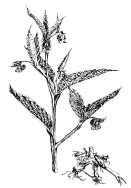 Wonderweed Wonderweed
Terrain: Ditches, watersheds, moist fields
Search Time/
Modifier: 12/-25%
Preparation Time/
Modifier: 6/0
Application: Elixir/Powder
Save: None
Value: 100 gp for flower elixir/10 gp for root/leaf powder
- Effects: This brew utilizes the large, hairy-leafed comfrey plant
as its primary ingredient. The hairy stalks of the comfrey can
grow two to three feet high and are hollow. The leaves produce
a gummy resin which is apparent if the leaves are chewed gently.
At the tops of the stalks are small bell-shaped flowers of violet
or occasionally white color that bear tiny black seeds. The herb
has a large root system; its roots are black on the outside and
white on the inside. The roots are brittle and are filled with
a clear, nearly tasteless sap.
- The roots and leaves of the comfrey when mixed with other special
ingredients can be dried and powdered for later use as a healing
compound which when sprinkled on a fresh wound heals 1d4 hit points
immediately. Enough active ingredients can be gathered in a single
search to produce 2d6 applications of the powder.
- The more prized application is made by taking around a dozen flowers
(which may only be harvested in the summer) and mixing them with
wine and other special ingredients. When this elixir is consumed,
a character who has lost Strength through magical or nonmagical
means regains one point of lost Strength in one round. The elixir
may only be used once per day.
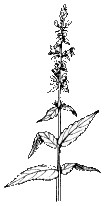 Woundwort Woundwort
Terrain: Rocky hills
Search Time/Modifier: 8/-30%
Preparation Time/
Modifier: 8/-10%
Application: Poultice
Save: None
Value: 25 gp
- Effects: When ground into a fine paste, mixed with other ingredients and boiled with honey the leaves of the smallish woundwort stop bleeding (such as that caused by a critical hit) and heal 1d4 hit points on a wounded creature.
- Note, while a woundwort poultice will always stop bleeding and heal hit points, dwarves and Uldra sometimes react adversely to it. If a woundwort poultice is used on a dwarf or Uldra there is a 25% chance of the herb causing temporary (1d6 rounds) blindness in the recipient.
- Racial modifiers: Elberethi elves receive a +10% bonus to their Herbal Magic skill score. Variquesti elves, Forest Gnomes, and Uldra receive a +5% bonus to this skill.
|